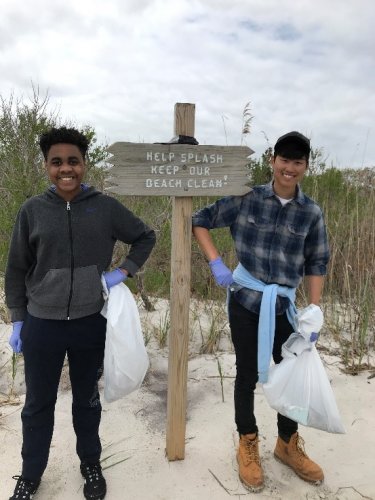
Service Learning - Beach Cleanup
Categories: Service LearningSecondary
Before their service learning class, they didn’t know how much plastic affected real life.Sea turtles eat plastic bags thinking they are jellyfish, but they cannot process it and end up dying of starvation. When baleen whales feed on tiny organisms in the ocean, they end up eating different varieties of plastic, such as grocery gabs, ziplock bags and bottles. They end up dying of starvation as well. Over 50% of the oxygen we breathe is from our oceans, and if the oceans break down it will affect life on land.
With the knowledge our students now have, they feel a great responsibility to educate others. They believe everyone should have the experience of being able to learn something in the classroom and then go out and apply it to real life situations to make our world a better place. Their teacher Mr. Winant showed them how this relates to our responsibility as Christians to take care of and protect the Earth.
WHAT THE PEOPLE SAY…
-
" The service-learning program at SCS goes hand and hand with Christian education. Students learn about loving Jesus and helping those in need. Then, they practice what they learn by going out and being the "hands and feet" of Jesus to their communities. "
Dr. Anna Ramos, SCS parent
-
" Knowing that our children are going to school and learning about Christ and hearing biblical truth that is not altered has confirmed to us over and over that SCS is the best choice we could make for our kids' education. "
Doug & Kelly Jansson, SCS parents -
" If you aim for heaven, you might get earth thrown in, besides. Aim for heavenly values by sending your kids to Smithtown Christian School, even if it means sacrifice. "
Daniel Buttafuoco, SCS Grandparent -
"SCS has been an incredible blessing to our family. Knowing our children are in a Christ-centered environment where they are loved, nurtured and prayed for by their teachers and other members of their school family is so important to us. "
Rachel Cardwell, SCS Parent -
"It's impossible to enter this school without coming into the presence of God. It's the only thing that can change lives and because of the faithful teachers, staff and culture of SCS, it changed mine."
Pastor Jeffrey Eichenlaub, SCS Alum
A ministry of: Smithtown Gospel Tabernacle

